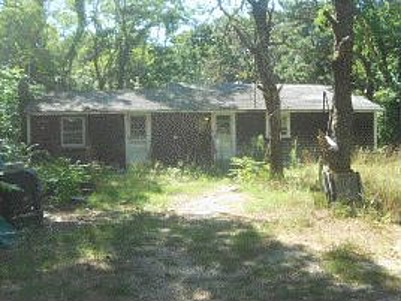The listing description is what really brings home this “Make Me Move” listing:
A complete tear down, may have toxic substances, such as lead and lead paint, asbestos tiles, old paint spills, oil spills, huge amounts of scrap waste throughout the property including two decaying travel trailers, dozens of old tires, oil tank for the oil furnace won’t meet code, knob and tube wiring, foundation won’t meet code, unfinished ceilings in both bedrooms, mold in kitchen and bath and probably inside the walls. Best thing is the septic passed inspection, although we believe it was passed as a favor to us.
Bulldozing and burning the entire property probably won’t be enough to sterilize this toxic wasteland dump.
I certainly hope that all the problems with this property already made them move!
Heh, I love that they uploaded a “Photos unavailable at this time” image. Although I would have enjoyed seeing some of the toxic decaying scrap waste, too.






…and to double-down on the “photo unavailable” photo, the listing site automatically inserted a glossy video link “Want to Remodel?” :D
We used to call these “Maine Estates” at my house, because that’s where we first saw places like this full of junk, cars up on blocks, etc. In a historically depressed area (and/or to an owner who survived the Great Depression), private scrapyards are valuable parts and materials.
*This* one, however, happens to be on Cape Cod between two protected park/wildlife sanctuaries. Pa-ching.
Looks like the fun started when somebody’s cantankerous, *grandfathered* old relative finally popped his clogs: it sold to someone in 2011 for $75k, after which it apparently sat and festered through another sale for $220k last March. Now that lucky buyer (s.w.a.g. would be some family member compelled to buy peace from the original purchaser, who’d ended up feeling hard done by after the dust settled), as I say, *that* lucky buyer now just wants the horrible dump off their hands and (finally) out of the family… tip off being that the local inspectors might bless the septic “as a favor” … I’m thinking, “to the family.” In hopes of finally getting the place cleaned up… before it totally leaks into the sanctuaries. :)
What I don’t get is how a piece of property can be sold with the description “may have toxic substances.” Showing my real estate procedures ignorance… doesn’t there have to be some sort of inspection before property can be transferred? And wouldn’t that include determination of whether the property is safe? If there are toxic substances, don’t environmental laws require some sort of clean-up before title can be transferred? Or can toxic areas just keep passing from owner to owner, etc, with no requirement for anyone to ever do anything about the situation? I fear my notion of what sounds like a sensible procedure to enact has not yet caught on in every jurisdiction. More’s the pity for anyone – or anything – living anywhere close to this sort of place. If only the critters living at the wildlife area next door knew to steer clear of this place…
However, the description has a ring of purposeful spitefulness about it, almost as though whoever got stuck with trying to offload it really has it in for whomever put them in that position. “Fine! You got me into this mess, but ultimately you’ll be the one in the line of fire when the legal s**t hits the fan, so what do I care if make the spray bigger and a lot stronger?” Maybe the place is a total mess, but maybe also it isn’t as dangerous as it sounds. If true, that’s some feud the lister is embroiled in… (O_o)
@Emerald63: Well, I think we’re seeing a private sale offering, to wit Zillow, putting all the “as is” right out there for the buyer to deal with and finance as they may.
It does, sadly, reverberate with the sort of agonizingly hurtful old arguments that could take another twenty years of attrition to resolve.
@Emerald63: The $75k price was probably the estate transfer you’re guessing happened (a lot of those things can go in at unusual values). Given the mess the property is, I could see them getting an appraiser to write down a very low value for the estate.
My guess is that the second sale might actually have been some poor investor/someone looking for a weekend house on Cape Cod who thought they were getting a good deal and didn’t do their homework. They probably bought the property for the land (assuming they could just tear down the house and build something else on it) and realized they had a /real/ disaster that would be far too expensive to actually tear down.
Also, I’m not sure what happens if someone dies, leaves a superfund site behind, and nobody will take it (the intended heir disclaims it, nobody else is interested, and the estate can’t even offload it for $1). There might well be some legal protections in there, lest such a situation prove impossible to resolve. Imagine, if you will, the following:
-The estate is eventually exhausted of other assets and thus can’t pay taxes on the property.
-No heir will take the property.
-Nobody will buy the property.
I’m not sure how such a situation would be resolved, since you can’t /force/ someone to accept the property.
@Gray: Thank you for the information, Gray. It’s given me a better picture of what may have happened with this property. I imagine the “no one wants it” scenario you describe is addressed differently according to state laws, but I think one approach may be common (only guessing, though)…
It’s my understanding that usually, when there are effectively no heirs, anything remaining of the estate – property and contents thereof – reverts to government ownership. The particular governmental body involved (township, county, state, etc) then auctions off what there is and adds the proceeds to the public coffers. However, depending on local environmental law, the governmental body may be required to clean things up before auctioning them. At the very least I assume they’d be required to disclose the exact nature of the property.
Obscure fun fact of the day – an escheator is a government employee who assesses the contents of an estate with no heirs and their passage to state ownership. This transfer of ownership is known legally as an escheat. I know this because one of my Revolutionary War ancestors held numerous public offices after the War, including being an escheator. And yes, I had to look it up when I found out. ;)
My first thought was “Who would buy it?” But when I saw the layout of the plot, I thought, “develop”. you could split the plot, clean up the mess, and develop two decent homes for a moderate return. For someone looking at the place with something like that in mind, the listing of the expenses just to start building in order to calculate any profit from the venture is very helpful.